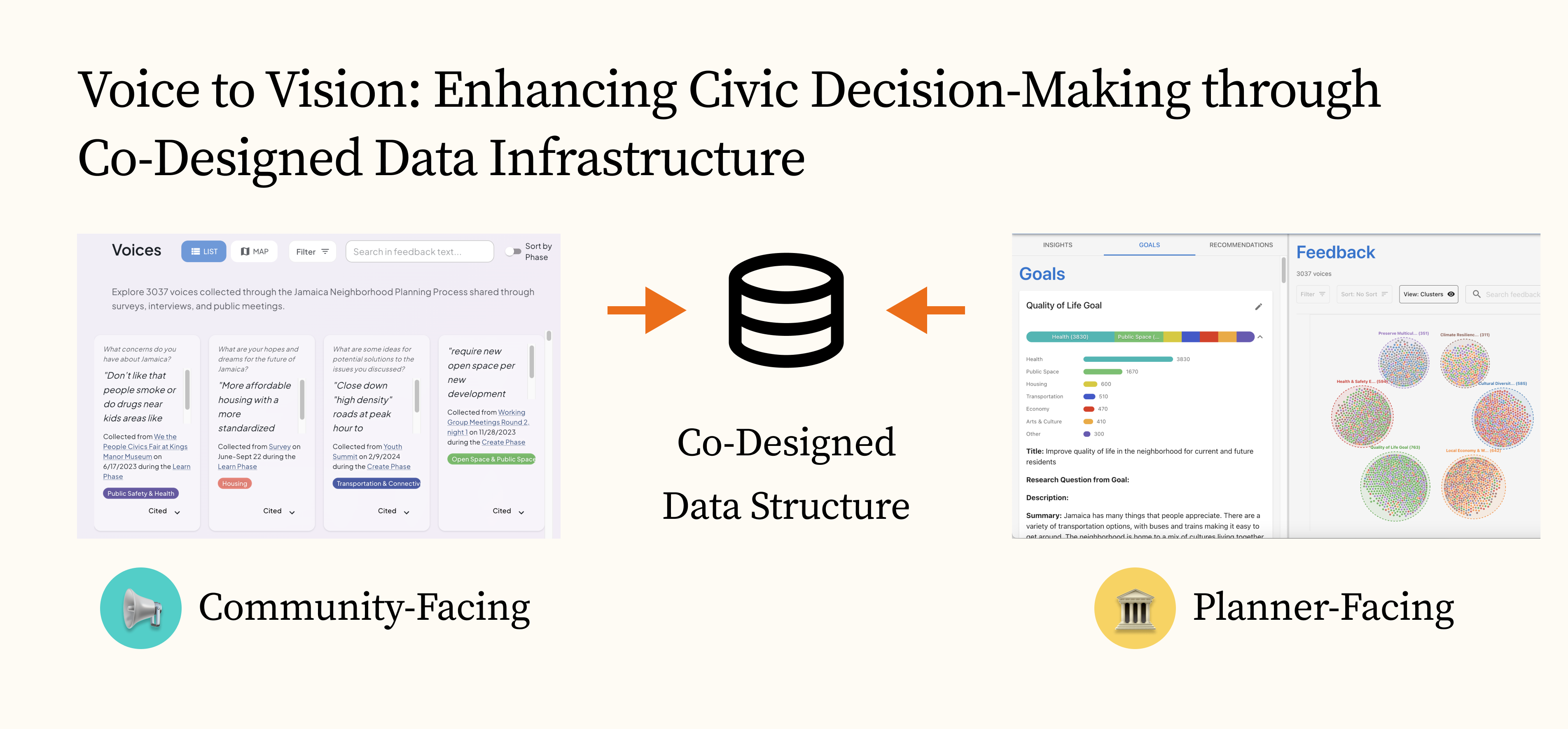
Voice to Vision: Enhancing Civic Decision-Making through
Co-Designed Data Infrastructure
As trust in community engagement and democratic
decision-making declines, there's an urgent need for increased
transparency and accountability in civic processes. For this
project, I collaborated with the New York City Department of
City Planning to co-design data infrastructure that enhances
civic decision-making. Using a research-through-design
approach with both planners and community members, we
developed an interoperable data structure and an interactive
visualization system with two key components: a
community-facing platform that clearly demonstrates how public
input informed decisions, and a planner-facing tool that
supports the complex sensemaking process of analyzing
community feedback. Voice to Vision addresses critical gaps in
current engagement processes by providing communities with
clear responses to their input while offering planners
essential support for analyzing diverse feedback. This project
contributes to the participatory design space while offering
practical tools that can help rebuild trust in civic
decision-making processes.
This is an ongoing project!

Evaluating Narrative Strategies for Constructive Community
Engagement
In contentious community issues like school redistricting,
effective communication is essential but challenging. For this
project, I'm collaborating with Winston-Salem/Forsyth County
Schools to investigate how narrative strategies can foster
understanding across diverse perspectives during their
redistricting process. I developed and evaluated 124
AI-generated, human-reviewed narrative summaries that distill
community input from over 13,000 comments, 8,300 survey
responses, and 170+ hours of audio recordings. Through a field
deployment, user studies with community members, and
controlled experiments, I'm examining how varying the balance
between concrete experiences and abstract opinions in
narratives influences readers' understanding and engagement.
This research explores how AI can help create narratives that
reflect both diverse and shared experiences within large
communities, and how narrative strategies can effectively
demonstrate that community input was meaningfully considered
in decision-making processes.
This is an ongoing project!

Coalesce: An Accessible Mixed-Initiative System for Designing
Community-Centric Questionnaires
Effective community engagement is crucial for inclusive
governance, but civic leaders often struggle to design
questions that gather meaningful input due to time constraints
and limited experience. For this project, I developed
Coalesce, a mixed-initiative system that leverages AI to help
civic leaders craft tailored and impactful questions for
surveys, interviews, and conversation guides. Drawing on
questionnaire design best practices, Coalesce improves
question readability, enhances specificity, and reduces bias.
The system was developed through interviews with 30 civic
leaders and 14 iterative feedback sessions. In real-world
evaluations with 16 participants using Coalesce for their own
community projects, we found it improved their confidence in
questionnaire design, supported diverse workflows, and
fostered learning while raising important considerations about
human agency and AI reliance. This work demonstrates how
intelligent user interfaces can help civic leaders engage more
effectively with their communities.
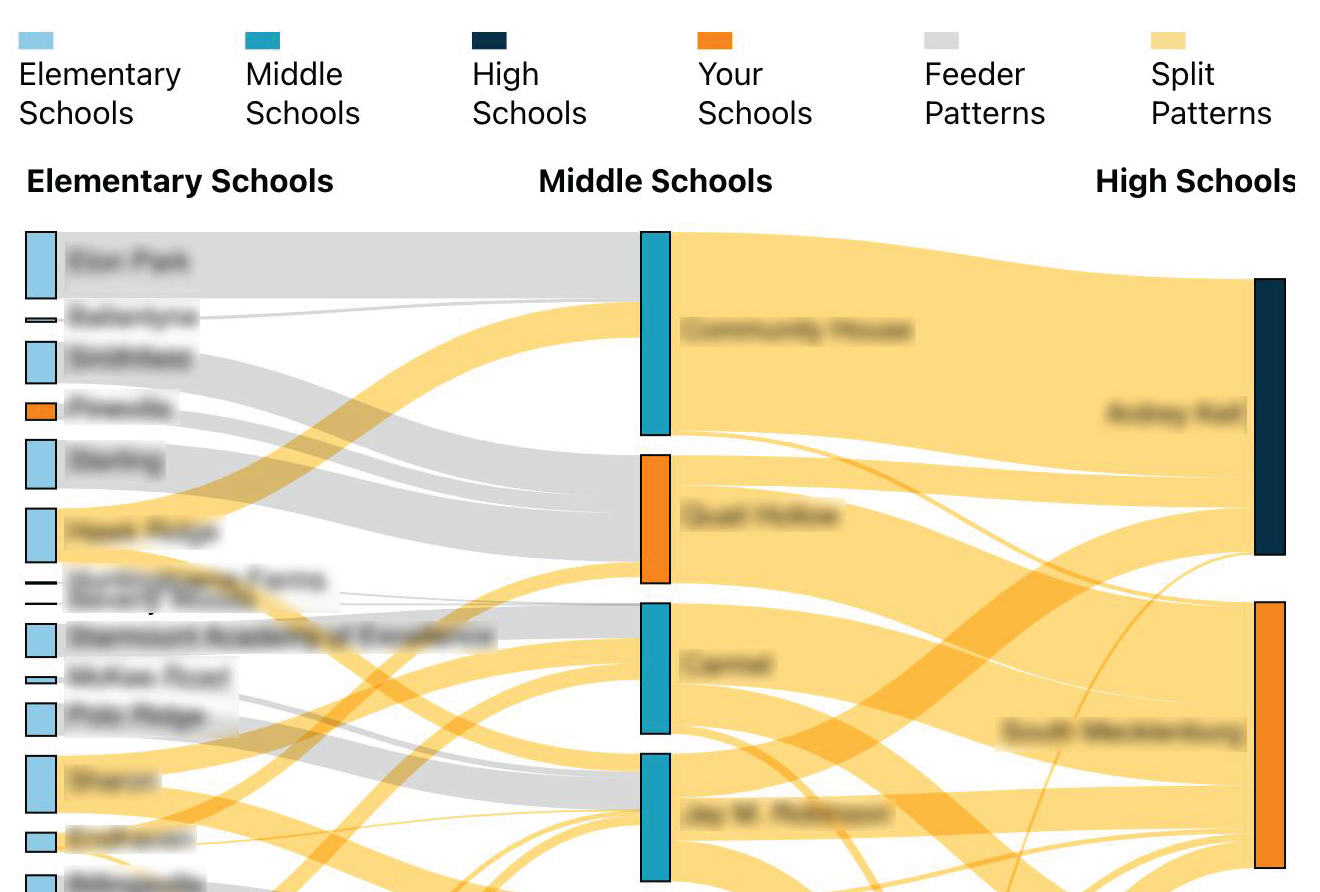
BoundarEase: Fostering Constructive Community Engagement to
Inform More Equitable Student Assignment Policies
School district attendance boundaries significantly impact
educational access and equity, but community engagement
processes for changing these boundaries are often polarizing
and ineffective. I collaborated with a large US school
district serving nearly 150,000 students to design
BoundarEase, a web platform that helps community members
explore and provide feedback on potential boundary changes.
Through formative interviews with 16 community members, we
identified key challenges in existing engagement processes:
individualistic thinking, lack of empathy for different
perspectives, and difficulty understanding policy impacts. The
BoundarEase platform addresses these frictions by visualizing
proposals and facilitating structured feedback based on
community preferences. Our user study with 12 participants
showed that BoundarEase encouraged people to consider impacts
beyond their own families and increased transparency around
policy proposals. This project offers both a practical tool
for school districts and insights into how technology can
reduce polarization in local educational policymaking.

Sage: Design Implications of a Task-Oriented Hybrid Chatbot
for Strategic Storytelling
While storytelling is essential for self-advocacy, people
often struggle to develop and deliver strategic narratives,
especially in high-stakes situations. For this project, I'm
developing Sage, a hybrid architecture chatbot that supports
strategic storytelling by combining traditional rule-based
systems with the generative capabilities of large language
models. Through evaluation with 21 experts across negotiation,
communications, and HCI fields, we've demonstrated the
effectiveness of this hybrid approach while exploring the
fundamental tension between authenticity and impact in
AI-assisted storytelling. Our findings reveal important design
considerations for conversational AI systems, particularly
around memory management and preserving narrative authority.
This work offers insights into how AI can empower marginalized
voices while maintaining the structural effectiveness required
for high-stakes communication.
This is an ongoing project!
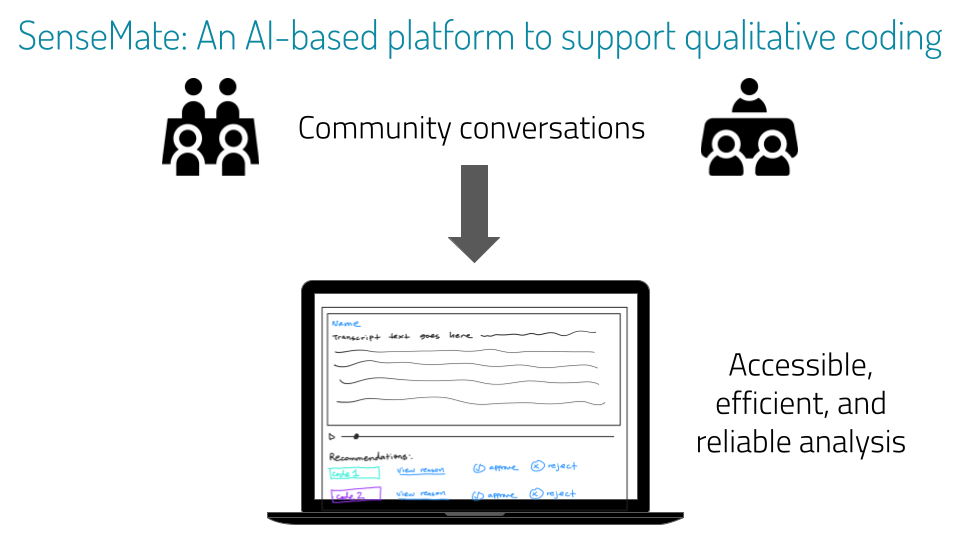
SenseMate: An Accessible and Beginner-Friendly Human-AI
Platform for Qualitative Data Analysis
Many community organizations want to engage in conversations
with their constituents but lack the support they need to
analyze feedback through qualitative data analysis (QDA), or
sensemaking. As a result, it's important to provide accessible
entry points into the analysis process for people with no
prior experience. For my master's thesis, I designed
SenseMate, an AI-based platform to support non-researchers in
qualitative coding. After developing a codebook, or a list of
themes, from a subset of the data, qualitative coding involves
applying the codebook to all the data. SenseMate aims to
transparently recommend themes for pieces of text to increase
the efficiency and reliability of qualitative coding. Through
an online experiment with 180 novice users, we found that
SenseMate increased intercoder reliability by 29% and improved
coding accuracy by 10%. The platform features rationale
extraction models that provide explainable AI recommendations
while preserving user privacy and control, making it uniquely
suited for community organizations with limited resources.

Future CMS Schools
I collaborated with an amazing team of people from CCC and
Charlotte-Mecklenburg Schools (CMS)
to create a new form of community engagement around two magnet
schools opening in the fall of 2023. Through facilitated
small-group conversations and various online platforms that we
designed, we were able to more deeply engage CMS’ parents,
students, and other community members in dialogue around their
hopes and concerns for the new schools.
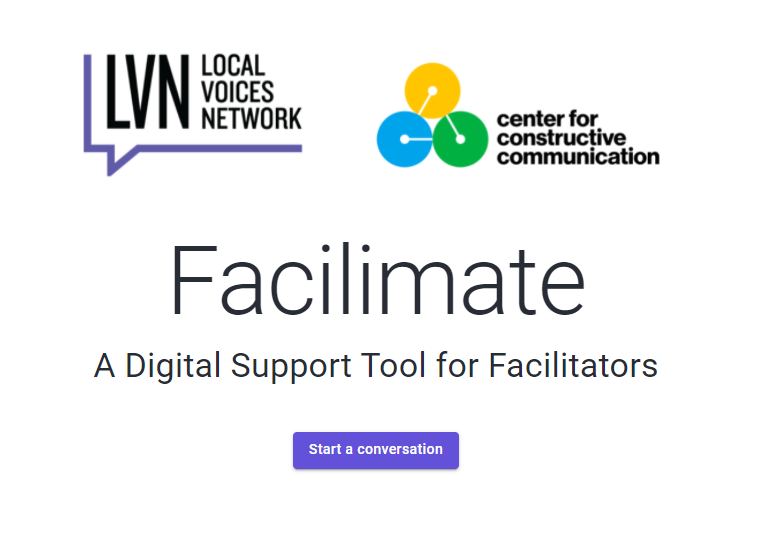
Facilimate
I applied user-centered design methods to create a digital
support tool for people who facilitate small-group
conversations. Using Facilimate, facilitators at any skill
level can more easily manage time and follow conversation
guides.
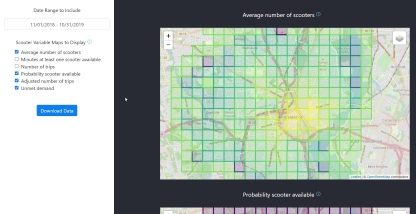
Shared Mobility Visual Analytics Tool
I created a visual analytics tool that can help city planners
manage their shared mobility services. The tool is a React web
application that analyzes scooter-share event data, estimates
spatial demand, and generates an interactive data
visualization page where users can map out usage and demand.

How to Not Get Rich: An Empirical Study of Donations in Open
Source
Open source is ubiquitous and forms the digital infrastructure
of our society, yet sustaining open source has become
increasingly difficult due to growing demands and developer
burnout. Donations are gaining in popularity as a potential
method of sustaining open source. This research project is the
first large-scale study to investigate the prevalence and
impact of donations on open source.

The Relationship between Public Transit and Bikeshare
Ridership
In this data science project, I explored the causal
relationship between bikeshare and public transit networks in
Boston, Philadelphia, and Washington DC using doubly robust
estimators. I applied the economic concept of complements and
substitutes to analyze how bikesharing could be used to
support or supplant the first-mile/last-mile problem.
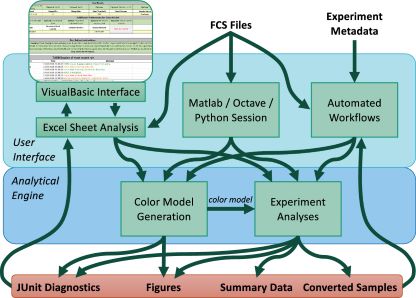
TASBE Flow Analytics
TASBE is a user-friendly and open-source environment that
visually represents and analyzes flow cytometry data. In
addition to feature development, I worked closely with
biologists to design a customizable Excel interface that
enables biologists without programming skills to set up
analysis workflows in TASBE.
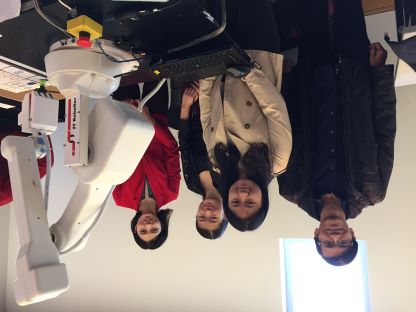
Interactive Robotics Research
I collaborated with three other students to analyze robot
vision data using python OpenCV to program a robotic arm to
autonomously play the card game SET (project 1) and to
replicate user-built cube structures (project 2).
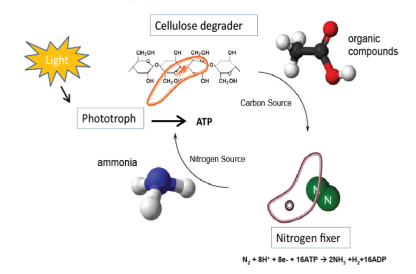
Computational Microbiology Research
I worked on several computational microbiology research
projects with the goal of generating unified theories of
microbial community function that impact all aspects of our
lives, ranging from the environment to human health. I applied
my programming and data science knowledge to analyze
metagenomics data to understand nutrient cycling, apply
network analysis to examine the effects of perturbation on
microbial communities, and write software that mines genome
databases.











